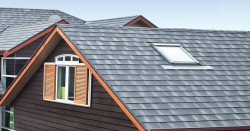The British Standard for Slating and Tiling BS5534 provides the industry with guidance on best practice, relating to the installation of a roof. Contained within it, is a vast array of information, ranging from batten selection, to the methods of fixing, through to wind uplift formulas, providing a means of calculating fixing specification.
Whilst installing to the British Standard is not a requirement by law, it can be included within a specification. In most instances, manufacturers providing products for the roofing industry will usually ensure their installation guidelines closely follow the standard and any deviation will require documented evidence to prove suitability. Also, most third party warranty providers, such as the NHBC or Zurich, will only cover a building if it has been installed to relevant British Standards.
The revisions to the code of practice that took place last February 2015 for slating and tiling has ensured that UK roofs are more secure in the face of increasing extreme weather conditions – it is clear that extreme weather events such as gale force winds, driving rain and flooding are on the rise and placing more strain on the UK roofscape than ever before.
With the new Construction Products Regulation, there is a push to harmonise many of the standards and regulations across the EU. The update to the British Standard will ultimately ensure that the UK is more closely aligned with the equivalent standards and practices outlined in the equivalent Eurocode.
There are three significant changes – every tile has to be mechanically fixed with either a clip or a nail as mortar alone is no longer deemed sufficient on its own to secure the tiles and their associated fittings to a roof, so areas including ridges, hips and verges will now require mechanical fixing as well.
The standard also introduces new requirements to secure lightweight underlays and prevent an occurring problem of ‘ballooning’, caused by wind deflection, which has been known to place a load on the underside of the roof covering, capable of dislodging it.
Tilcor Roofing Tiles
RCM Building Boards and Facades have recently launched a range of products suitable for the roofing markets including park homes, BISF houses, housing association refurbs and conservatories.
The innovative stone coated and satin-finished roofing system incorporates cutting-edge Zincalume protective steel, which gives the tiles longevity and a service life over that of traditional galvanised tiles – delivering a visually appealing finish and long term durability. Manufactured in New Zealand using materials sourced only in the region allows Tilcor’s products to be a leader in the industry and across Europe. The Tilcor range of pressed metal roofing tiles includes five distinctive profiles.
The profiles consist of a Classic texture tile, popular because of its angular look with sharp clean lines and sloping edges that add dimension to a roof top. While the bond design carries a more traditional appearance, with a characteristic scalloped form, offering the lightweight advantages of steel. The unique shingled texture of the Royal design adds dimensions and shadow lines to a roof. Whereas, the Shake surfaced tile features a wood-grain form and is created to enhance the shadow lines and create a visual contrast. The finish of the Tutor tile follows a more traditional European appearance and is well suited to both modern and traditional homes.
The robust Tilcor roofing systems come with weather proof warranties and deliver unique strength and resilience, even in harsh climates. The tiles have been tested to withstand the impact of strong winds, fire, snow and torrential rains, delivering a watertight and fire resistant solution.
Ian Quinton, Managing Director of RCM said: “As the changes to the standards primarily affect roofing and building contractors, RCM are fully aware of the standards required to meet the UK’s challenging weather conditions. Our new Tilcor roofing tile range consistently delivers quality and product performance and offers contractors a viable alternative to slate and clay tiles.”
Sustainability is an important focus for Tilcor, with all steel products being fully recyclable. All offcuts and unused materials are collected from site and recycled, improving the environmental outlook for home owners and contractors.
Tilcor Roofing Tiles Advantages
• Provide a natural low glare finish
• Almost five times lighter than an equivalent concrete or clay tile roof
• A premium roofing product for use in extreme conditions in over 80 countries
• Tilcor offers an impressive warranty
• Fully recyclable
Informative CPD Events
For those interested in finding out more, RCM provide informative CPD sessions including: a guide to materials, applications and specification considerations for building boards, internal and external linings and rainscreen facades, covering:
• What a specifier needs to consider
• Board materials and benefits
• Board applications
• Work on site
www.buildingboards.co.uk/









